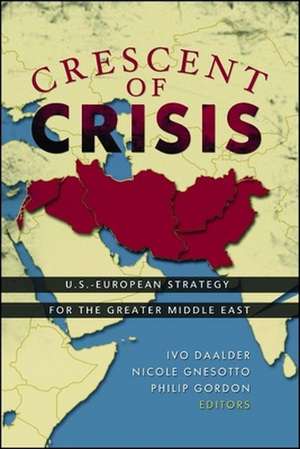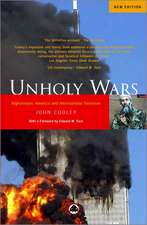Crescent of Crisis: U.S.-European Strategy for the Greater Middle East
Editat de Ivo H. Daalder, Nicole Gnesotto, Philip H. Gordonen Limba Engleză Paperback – 10 ian 2006
The greater Middle East region is beset by a crescent of crises, stretching from Pakistan through Afghanistan, Iran, and Iraq to the Israeli-Palestinian conflict. Together, these five crises pose the most pressing security challenges faced by the United States and its European allies—ranging from terrorism and weapons proliferation to the rise of fundamentalism and the lack of democracy. Until now, Europe and the United States have approached these issues (indeed, the Middle East as a whole) in differing ways, with little effective coordination of policy. In fact, how best to deal with the greater Middle East has emerged as one of the most contentious issues in U.S.-European relations. The need for a common approach to the region is more evident than ever. This book brings together some of Europe and America's leading scholars and practitioners in an effort to develop a common approach to resolving the five major crises in the region. European and American authors provide succinct and fact-filled overviews of the different crises, describe U.S. and European perspectives on the way forward, and suggest ways in which the United States and Europe can better cooperate. In the conclusion, the editors synthesize the different suggestions into a roadmap for U.S.-European cooperation for addressing the challenges of the Greater Middle East in the years ahead. Contributors include Stephen Cohen (Brookings Institution), James Dobbins (RAND), Toby Dodge (University of London), Martin Indyk (Saban Center at Brookings), Kenneth Pollack (Saban Center at Brookings), Jean-Luc Racine (Center for the Study of India and South Asia), Barnett Rubin (New York University), Yezid Sayigh (University of Cambridge), and Bruno Tertrais (Fondation pour la Recherche Stratégique).
Preț: 215.02 lei
Nou
Puncte Express: 323
Preț estimativ în valută:
41.15€ • 42.91$ • 34.20£
41.15€ • 42.91$ • 34.20£
Carte tipărită la comandă
Livrare economică 20 martie-03 aprilie
Preluare comenzi: 021 569.72.76
Specificații
ISBN-13: 9780815716891
ISBN-10: 0815716893
Pagini: 263
Dimensiuni: 152 x 229 x 18 mm
Greutate: 0.37 kg
Editura: Brookings Institution Press
Colecția Brookings Institution Press
Locul publicării:United States
ISBN-10: 0815716893
Pagini: 263
Dimensiuni: 152 x 229 x 18 mm
Greutate: 0.37 kg
Editura: Brookings Institution Press
Colecția Brookings Institution Press
Locul publicării:United States
Notă biografică
Edited by Ivo H. Daalder; Nicole Gnesotto and Philip H. Gordon
Descriere
A Brookings Institution Press and EU Institute for Security Studies publication
The greater Middle East region is beset by a crescent of crises, stretching from Pakistan through Afghanistan, Iran, and Iraq to the Israeli-Palestinian conflict. Together, these five crises pose the most pressing security challenges faced by the United States and its European allies—ranging from terrorism and weapons proliferation to the rise of fundamentalism and the lack of democracy. Until now, Europe and the United States have approached these issues (indeed, the Middle East as a whole) in differing ways, with little effective coordination of policy. In fact, how best to deal with the greater Middle East has emerged as one of the most contentious issues in U.S.-European relations. The need for a common approach to the region is more evident than ever.
This book brings together some of Europe and America's leading scholars and practitioners in an effort to develop a common approach to resolving the five major crises in the region. European and American authors provide succinct and fact-filled overviews of the different crises, describe U.S. and European perspectives on the way forward, and suggest ways in which the United States and Europe can better cooperate. In the conclusion, the editors synthesize the different suggestions into a roadmap for U.S.-European cooperation for addressing the challenges of the Greater Middle East in the years ahead.
Contributors include Stephen Cohen (Brookings Institution), James Dobbins (RAND), Toby Dodge (University of London), Martin Indyk (Saban Center at Brookings), Kenneth Pollack (Saban Center at Brookings), Jean-Luc Racine (Center for the Study of India and South Asia), Barnett Rubin (New York University), Yezid Sayigh (University of Cambridge), and Bruno Tertrais (Fondation pour la Recherche Stratégique).
The greater Middle East region is beset by a crescent of crises, stretching from Pakistan through Afghanistan, Iran, and Iraq to the Israeli-Palestinian conflict. Together, these five crises pose the most pressing security challenges faced by the United States and its European allies—ranging from terrorism and weapons proliferation to the rise of fundamentalism and the lack of democracy. Until now, Europe and the United States have approached these issues (indeed, the Middle East as a whole) in differing ways, with little effective coordination of policy. In fact, how best to deal with the greater Middle East has emerged as one of the most contentious issues in U.S.-European relations. The need for a common approach to the region is more evident than ever.
This book brings together some of Europe and America's leading scholars and practitioners in an effort to develop a common approach to resolving the five major crises in the region. European and American authors provide succinct and fact-filled overviews of the different crises, describe U.S. and European perspectives on the way forward, and suggest ways in which the United States and Europe can better cooperate. In the conclusion, the editors synthesize the different suggestions into a roadmap for U.S.-European cooperation for addressing the challenges of the Greater Middle East in the years ahead.
Contributors include Stephen Cohen (Brookings Institution), James Dobbins (RAND), Toby Dodge (University of London), Martin Indyk (Saban Center at Brookings), Kenneth Pollack (Saban Center at Brookings), Jean-Luc Racine (Center for the Study of India and South Asia), Barnett Rubin (New York University), Yezid Sayigh (University of Cambridge), and Bruno Tertrais (Fondation pour la Recherche Stratégique).











